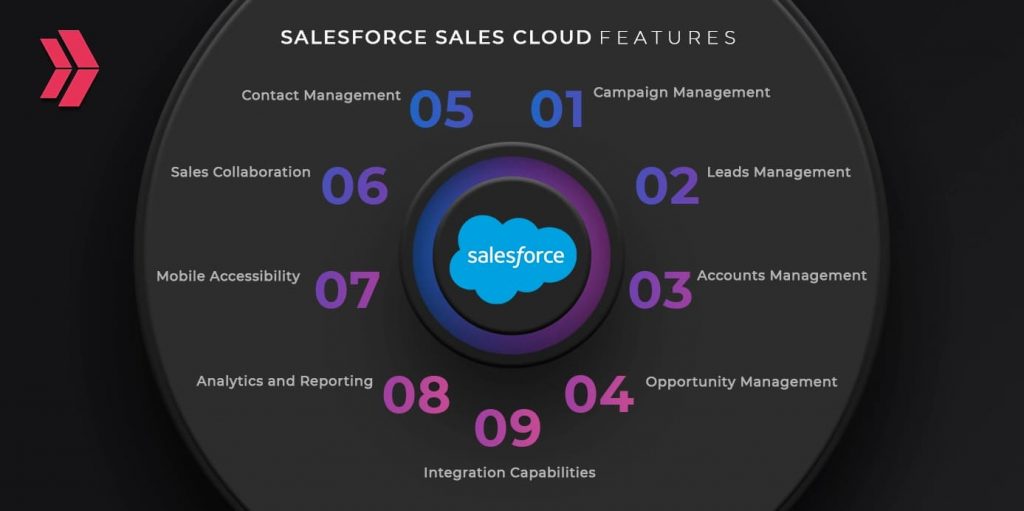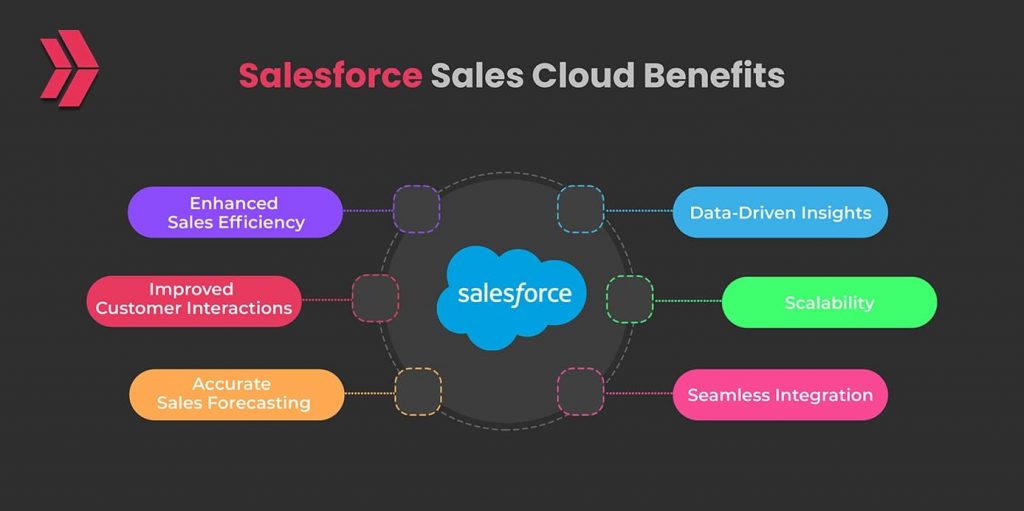In today’s ever-changing business atmosphere, staying ahead of the competition requires a sophisticated sales and customer relationship management approach. Salesforce Sales Cloud emerges as a transformative solution, enabling businesses to revolutionize their sales strategies and achieve unparalleled growth. Salesforce Sales Cloud helped companies increase sales productivity by %29, according to FY23 Customer Success Metrics.
In this article, we’ll delve into the world of Salesforce Sales Cloud, helping you learn, understand, prepare to leverage its potential, and provide answers to popular questions about training and certification.

What is Salesforce Sales Cloud?
Salesforce Sales Cloud is a powerful CRM tool for managing customer relationships and is tailored specifically for sales professionals. This cloud-based solution helps businesses streamline their sales operations, enrich customer interactions, and increase income. Through advanced features and seamless integration, sales cloud Salesforce streamlines various aspects of the sales cycle, making it a pivotal tool for businesses aiming to optimize their sales operations.
What are the Features of Salesforce Sales Cloud?
Salesforce Sales Cloud is packed with a plethora of features designed to enhance the efficiency and effectiveness of sales teams. Here are the top 9 of Salesforce Sales Cloud features:
- Campaign Management
- Leads Management
- Accounts Management
- Opportunity Management
- Contact Management
- Sales Collaboration
- Mobile Accessibility
- Analytics and Reporting
- Integration Capabilities
Campaign Management
Campaign Management within Salesforce Sales Cloud is a feature that allows businesses to create and oversee marketing initiatives across multiple channels. This tool enables effective targeting, monitoring, and analysis of campaigns, ensuring that sales efforts are aligned with marketing strategies. By centralizing campaign management, organizations can enhance their ability to engage potential customers and drive conversions.
Leads Management
Leads Management is an application that enables sales teams to capture, track, and nurture potential leads efficiently. This ensures that potential customer is kept from falling through the cracks and that each lead is given the attention it deserves. By automating lead tracking and nurturing, sales representatives can focus their efforts on high-priority leads, increasing the likelihood of successful conversions.
Accounts Management
Accounts Management is a foundational feature of Salesforce Sales Cloud, providing a comprehensive view of customer accounts. This feature encourages companies to keep comprehensive profiles of their customers, such as contact data, records of transactions, and preferences. Such insights enable personalized interactions, fostering stronger customer relationships and higher customer satisfaction.
Opportunity Management
Salesforce Sales Cloud’s Opportunity Management is the feature that empowers organizations to successfully oversee their sales channels. Sales teams can track and evaluate potential deals, predict revenue, and systematically distribute resources. This feature enables businesses to prioritize opportunities, distribute resources efficiently, and maximize the success of their sales tactics.
Contact Management
Salesforce Sales Cloud’s contact management is a function that ensures that sales representatives have easy access to up-to-date contact information, facilitating efficient communication and relationship-building. Maintaining an organized database of customer contacts is crucial for successful sales interactions.
Sales Collaboration
Sales Collaboration is an element within Salesforce Sales Cloud that supports teamwork and knowledge sharing among sales team members. By fostering collaboration, organizations can tap into the collective expertise of their sales force, leading to innovative solutions, better strategies, and improved overall performance.
Mobile Accessibility
Salesforce Sales Cloud’s Mobile Accessibility is an aspect that empowers sales professionals to stay connected and productive even when they’re away from their desks. In today’s mobile-centric society, mobile access to vital sales data is crucial. This accessibility ensures that no opportunities will be lost and that all communications with customers will be timely and pertinent.
Analytics and Reporting
Salesforce Sales Cloud’s Analytics and Reporting is the feature that provides sales teams with valuable insights into their performance, customer behavior, and market trends. This data empowers businesses to identify strengths, weaknesses, and opportunities, allowing them to fine-tune their sales approaches for optimal results.
Integration Capabilities
Salesforce Sales Cloud’s Integration Capabilities is a capability that facilitates seamless collaboration between different departments and systems within an organization. By integrating with marketing automation tools, customer support systems, and other business applications, organizations can ensure that sales efforts are aligned with overall business objectives and strategies.

What are the Benefits of Salesforce Sales Cloud?
Here are the top 6 benefits of Sales Cloud in Salesforce:
- Enhanced Sales Efficiency: Streamlined processes and automation reduce manual tasks, allowing sales teams to focus on high-value activities.
- Improved Customer Interactions: Comprehensive customer profiles and interaction history enable personalized and meaningful engagements.
- Accurate Sales Forecasting: Advanced analytics and reporting provide insights that lead to more accurate sales predictions and revenue projections.
- Data-Driven Insights: Access to real-time data empowers sales professionals with the knowledge necessary for making educated choices.
- Scalability: Salesforce Sales Cloud grows with your business, accommodating increased sales volumes and expanding requirements.
- Seamless Integration: Integration with other tools enhances overall business efficiency and collaboration.
However, when you delve into Salesforce Sales Cloud implementation, it comes with certain limitations and considerations. So, you might be interested in the salesforce sales cloud pros and cons comparison. In addition to the above benefits, two important cons: Complexity; platform is presented in a unified place and Data Migration: it takes time and technical knowledge to transfer data from legacy systems.

How Much is Salesforce Sales Cloud?
Salesforce Sales Cloud pricing starts at $25 per user per month for the Starter edition. When considering the adoption of Salesforce Sales Cloud, one significant aspect to consider is the pricing. Salesforce Sales Cloud pricing varies according to a number of factors, including the size of your business, the features you need, and the degree of customization you require. It’s recommended to reach out to Salesforce’s sales representatives or consult their official pricing documentation to get an accurate quote tailored to your business needs.
FAQ about Salesforce Sales Cloud
Several common questions arise as businesses explore the potential of Salesforce Sales Cloud. In this section, to give you a solid grounding in the system, we’ll review some FAQs.
What’s the Difference between Sales and Service Cloud?
Salesforce offers a variety of cloud-based solutions to address various aspects of a company’s operations. One common curiosity is the difference between Salesforce Sales Cloud vs Service Cloud. While both are part of the Salesforce ecosystem, they serve distinct purposes.
Sales Cloud optimizes sales processes, lead management, opportunity tracking, and revenue forecasting. It is intended to increase the efficacy and speed of sales teams.
Service Cloud, on the other hand, is tailored for customer support and service interactions. It lets companies give superior customer service by managing inquiries, resolving issues, and delivering personalized support.
What is the Difference between Salesforce and Salesforce Sales Cloud?
Salesforce is a comprehensive cloud-based platform that offers various solutions to different business needs, including sales, marketing, customer service, and more. It’s important to clarify the distinction between Salesforce and Salesforce Sales Cloud.
Salesforce Sales Cloud specifically refers to the CRM solution designed for sales professionals. It encompasses tools and features aimed at improving sales processes, customer relationship management, and revenue growth.
What are the 6 Clouds in Salesforce?
Salesforce offers a range of cloud solutions that cater to various aspects of business operations. While Salesforce Sales Cloud is focused on sales processes, there are 6 other clouds in the Salesforce ecosystem:
- Sales Cloud
- Service Cloud
- Marketing Cloud
- Commerce Cloud
- Community Cloud
- Analytics Cloud (Einstein Analytics)
Which Salesforce Certification is for Sales Cloud?
Salesforce offers certifications that validate expertise in using its various cloud solutions. The salesforce sales cloud certification is known as the Salesforce Certified Sales Cloud Consultant certification. This certification demonstrates proficiency in implementing and optimizing Salesforce Sales Cloud to drive sales success.
How to Pass the Salesforce Sales Cloud Exam?
Preparing for the Salesforce Sales Cloud exam requires a structured approach. You had better begin with Salesforce’s official documentation and join Salesforce’s Trailhead platform for interactive learning modules. Practicing with mock exams and participating in study groups for better insights and debating principles. Whenever possible, gain hands-on experience with Salesforce Sales Cloud. Practical experience reinforces theoretical knowledge.
How to Learn to Use Salesforce Sales Cloud?
Learning to use Salesforce Sales Cloud is an investment that can significantly impact your sales strategy. Salesforce provides detailed documentation that covers the platform’s features and functionalities. Start by familiarizing yourself with this documentation. Salesforce’s Trailhead platform offers guided learning paths, modules, and projects related to Sales Cloud. This interactive approach helps you learn by doing. You must also consider enrolling in Salesforce training programs. These programs provide structured learning experiences and expert guidance. Salesforce also offers sandbox environments where you can practice using Sales Cloud without affecting your actual data. This hands-on practice is invaluable for skill development.
Final Thoughts
Salesforce Sales Cloud is a transformative tool that can revolutionize your sales strategy and elevate your business’s growth. By harnessing its advanced features, seamless integration capabilities, and data-driven insights, you can streamline your sales processes, interact with customers in more effective ways, and increase revenue.
If you’re looking to master Salesforce Sales Cloud and take your skills to the next level, consider exploring the Salesforce Admin and Developer course Clarusway offers. This in-depth training will give you all the tools you need to implement and use Salesforce Sales Cloud successfully.
In conclusion, Salesforce Sales Cloud offers a powerful suite of tools that can reshape the way you approach sales. It’s crucial to your company’s success that you fully grasp its capabilities, advantages, and constraints. Embrace the potential of Salesforce Sales Cloud and embark on a journey toward optimized sales strategies and enhanced customer relationships.




